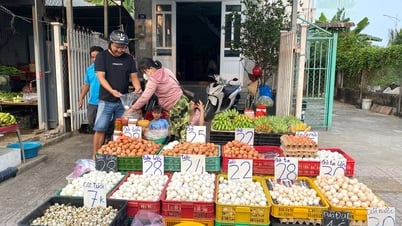At the E-commerce and Digital Economy Forum on November 21, Mr. Dang Anh Dung, Deputy General Director of Lazada Vietnam, cited data from a report by Google, Temasek & Bain, saying that about 57 million Vietnamese people will participate in online shopping in 2022, mainly in large cities such as Hanoi, Ho Chi Minh City, and Da Nang.
Mr. Tran Van Trong, General Secretary of the Vietnam E-commerce Association (VECOM), commented that Vietnam is in the stage of booming business through e-commerce platforms as the number of new online consumers continues to increase in quantity and quality. “They buy more with increased purchase value, and their online shopping skills are more proficient,” he assessed.
But people's shopping habits are also gradually changing with the emergence of new shopping trends. According to the Deputy General Director of Lazada Vietnam, the new generation of technology-savvy consumers who are willing to pay are the most important part of the digital economy. Statistics from this e-commerce platform show that 43% of young users such as GenZ (born from 1997 onwards) access shopping apps every day. Each person buys an average of 7 product categories on Lazada in the period of 2021-2023.
“Young users are becoming more demanding, they tend to look for value when making purchases and will change brands if they lack quality,” Mr. Dung shared.

Mr. Dang Anh Dung, Deputy General Director of Lazada Vietnam, speaking at the forum on November 21. Photo: Ministry of Industry and Trade
In fact, e-commerce is giving consumers more choices in products and services. To retain users, sellers need to bring more experiences to them, including increasing the value of products and sustainable services.
This is the basis for the increasingly clear “wave” of online business startups. “Millions of people do business online, most of whom do not have an offline store,” Mr. Tran Van Trong informed.
Merchants, especially e-commerce businesses, are also actively transforming digitally to adapt to business trends in the new period. "Many new policies for online sales have been introduced. Tax payments will be more strictly managed. Counterfeit and fake goods will be strictly handled," Mr. Trong added about policies for e-commerce.
According to statistics from the Ministry of Industry and Trade, the average growth rate of e-commerce is 16-30% per year. Retail sales through online sales channels in Vietnam could reach 20.5 billion USD this year. Research data from Google, Temasek & Bain also shows that Vietnam's digital economy has grown by more than 20% in the past two years, the highest in Southeast Asia.
The digital economy is expected to reach 30 billion USD this year, and will increase to 45 billion USD by 2025. Of which, e-commerce alone can reach 24 billion USD by 2025 and increase to 60 billion USD by 2030.
With this strong growth momentum, Deputy Minister of Industry and Trade Nguyen Sinh Nhat Tan said that now is the time for the industry to build new development models and strategies to help businesses recover and expand their markets after the difficulties have passed.
However, the leader of the Ministry of Industry and Trade also admitted that e-commerce still has many negative factors such as many businesses trading in goods with signs of counterfeiting trademarks, smuggled goods, and goods of unknown origin on a large scale. To maintain the growth momentum and protect buyers through online channels, Deputy Minister Tan said that the ministry will review the Law on Electronic Transactions, the Law on Consumer Protection, and increase decentralization and delegation of authority to localities to comprehensively manage transactions between buyers and sellers online.
Source VNE
Source


![[Photo] Scientific workshop "Building a socialist model associated with socialist people in Hai Phong city in the period of 2025-2030 and the following years"](https://vphoto.vietnam.vn/thumb/1200x675/vietnam/resource/IMAGE/2025/5/21/5098e06c813243b1bf5670f9dc20ad0a)
![[Photo] Determining the pairs in the team semi-finals of the National Table Tennis Championship of Nhan Dan Newspaper](https://vphoto.vietnam.vn/thumb/1200x675/vietnam/resource/IMAGE/2025/5/21/eacbf7ae6a59497e9ae5da8e63d227bf)
![[Photo] Prime Minister Pham Minh Chinh receives Rabbi Yoav Ben Tzur, Israeli Minister of Labor](https://vphoto.vietnam.vn/thumb/1200x675/vietnam/resource/IMAGE/2025/5/21/511bf6664512413ca5a275cbf3fb2f65)

![[Photo] Prime Minister Pham Minh Chinh receives the President of Asia-Pacific region of PowerChina Group](https://vphoto.vietnam.vn/thumb/1200x675/vietnam/resource/IMAGE/2025/5/21/0f4f3c2f997b4fdaa44b60aaac103d91)























































































Comment (0)